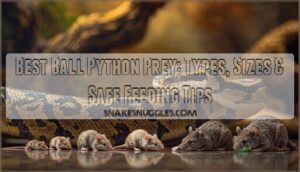This site is supported by our readers. We may earn a commission, at no cost to you, if you purchase through links.

You’ll find these docile snakes surprisingly easy to care for once you establish proper housing conditions. They rarely bite, live 20-30 years, and don’t require daily interaction like traditional pets.
However, you’ll need specific temperature and humidity setups, plus comfort feeding frozen rodents every 1-2 weeks. Initial costs run high for proper enclosures, and you’re committing to decades of care.
Think of them as low-maintenance roommates who won’t steal your food but need their environment just right. The real challenge lies in creating their perfect habitat setup.
Table Of Contents
- Key Takeaways
- Is a Ball Python a Good Pet?
- Housing a Ball Python
- Feeding a Ball Python
- Common Health Issues in Ball Pythons
- Frequently Asked Questions (FAQs)
- Is ball python a good pet?
- Are ball pythons friendly to humans?
- Do ball pythons like to be cuddled?
- What are the downsides of ball pythons?
- Do ball pythons like to be handled?
- Are ball pythons friendly?
- What are the pros and cons of ball pythons?
- Can I have a ball python as a pet?
- Is a ball python a good pet?
- Where can I buy a ball python?
- Conclusion
Key Takeaways
- You’ll love their docile nature and minimal care needs – ball pythons rarely bite, only need feeding every 1-2 weeks, and don’t require daily interaction like traditional pets.
- You’re committing to 20-30 years of specialized care with high upfront costs for proper temperature, humidity, and housing setups that must be maintained consistently.
- You’ll need patience with their feeding habits since ball pythons can refuse meals for months and require frozen rodents, plus they won’t provide the interactive companionship of typical pets.
- You can expect a low-maintenance roommate that’s perfect for busy owners or those with allergies, but you must be prepared for the long-term responsibility and specialized veterinary care requirements.
Is a Ball Python a Good Pet?
Ball pythons make excellent pets for many reptile enthusiasts due to their docile temperament and low-maintenance care requirements.
You’ll find these snakes rarely bite, grow to a manageable 3-5 feet in length, and require feeding only once per week, making them suitable for both beginners and experienced keepers with low-maintenance care.
Pros of Owning a Ball Python
Ball python ownership offers compelling advantages for reptile enthusiasts.
Their docile temperament makes them exceptionally beginner friendly, rarely biting when handled properly.
These low maintenance companions require minimal daily care, thriving in solitary comfort without constant attention.
Their hypoallergenic nature suits households with allergies perfectly.
Their low maintenance needs make them ideal for busy owners.
Here’s what makes ball pythons outstanding pets:
- Docile snake species – naturally calm and easy to handle
- Minimal care requirements – feeding every 1-2 weeks
- Allergy-friendly – no fur or dander production
- Long-term companions – 20-30 year lifespan
Cons of Owning a Ball Python
Despite their docile nature, ball python care presents several challenges you should consider before committing:
Despite their reputation as beginner-friendly pets, ball pythons come with hidden challenges that surprise many first-time snake owners.
- Feeding pickiness can frustrate new owners – your snake might refuse meals for months, testing your patience and wallet with wasted prey items.
- High humidity requirements demand constant monitoring – inadequate moisture levels trigger respiratory infections requiring expensive snake vet check visits.
- Long lifespan means decades of responsibility – proper snake enclosure maintenance and snake health monitoring become lifelong commitments.
They’re known for their calm temperament, often curling into a ball when stressed.
Housing a Ball Python
You’ll need to provide your ball python with a proper enclosure that meets specific size, temperature, and environmental requirements for its health and well-being.
Setting up the right habitat involves selecting appropriate tank dimensions, substrate materials, heating elements, and hiding spaces that create a secure environment where your snake can thrive, which is crucial for its overall well-being.
Enclosure Requirements
Your snake housing setup determines your pet’s comfort and health. Adult ball pythons need enclosures measuring at least 48"L x 24"W x 24"H, while younger snakes thrive in smaller spaces. Choose appropriate substrate types like cypress mulch or paper towels for easy cleaning.
A proper setup requires a suitable enclosure kit to ensure your pet’s environment is secure and comfortable. Your secure enclosure must include multiple features to mimic the snake’s natural habitat.
Your secure enclosure must include:
- Multiple hiding places on warm and cool sides
- Proper humidity levels between 60-80% with monitoring gauges
- Security measures including escape-proof mesh tops and sturdy locks to prevent escape and ensure the snake’s health and safety.
Temperature and Lighting
Getting your ball python enclosure set up means creating the right temperature control and lighting system.
Your snake needs specific heating gradients to stay healthy and digest food properly.
Here’s what you’ll need for proper reptile heating:
- Basking spots at 88-92°F using ceramic heat emitters
- Ambient temperature around 78-80°F throughout the enclosure
- Night temperatures can drop to 75-78°F safely
- Humidity levels between 50-60% with proper UVB importance considered.
To maintain healthy humidity, consider providing a humid hide with damp sphagnum moss.
Feeding a Ball Python
You’ll find that feeding a ball python is straightforward since they eat pre-killed mice or rats every 5-7 days when young, and every two weeks as adults.
Always use frozen-thawed prey rather than live animals to prevent injury to your snake.
Consider moving your python to a separate feeding enclosure to avoid territorial behavior.
Prey Selection
Choosing the right food for your ball python requires careful consideration of several factors.
Frozen/thawed rodents offer the safest option, eliminating injury risks from live prey. Your snake’s diet should consist entirely of prekilled prey that matches specific size requirements.
Many owners purchase pre-killed frozen feeders for their snakes.
Consider these essential factors when selecting rodent feeders:
- Prey size: Choose rodents 10-15% of your snake’s body weight
- Frozen vs. live: Always select frozen/thawed rodents for safety
- Nutritional value: Rats provide better nutrition than mice for adults
- Consistency: Maintain regular access to appropriately sized meals
- Species variety: Offer different rodent types for dietary enrichment
Feeding Schedule
Most ball pythons follow a predictable snake feeding schedule based on their age and size.
Understanding feeding frequency helps prevent overfeeding and guarantees proper growth.
Here’s your feeding timeline:
- Hatchlings (under 6 months): Every 5-7 days with frozen-thawed rodents
- Juveniles (6 months-2 years): Every 7-10 days, adjusting prey size accordingly
- Adults (2+ years): Every 10-14 days, monitoring for shedding cycle and refusal reasons
Monitor for regurgitation causes if overfeeding occurs.
Common Health Issues in Ball Pythons
Despite their hardy reputation, ball pythons aren’t immune to health problems. Understanding common issues helps you catch problems early and keep your scaly friend thriving.
Respiratory Infections top the list of ball python health concerns. You’ll notice wheezing sounds, mouth breathing, or mucus around their nostrils. Poor husbandry—wrong temperatures or humidity—usually triggers these infections.
Scale Rot develops when your snake sits in damp, dirty conditions too long. Look for red, inflamed patches on their belly that can progress to serious skin damage without treatment.
Here are four critical health issues to monitor:
- Parasites – both internal worms and external mites
- Obesity – from overfeeding or inadequate exercise space
- Dysecdysis – incomplete or stuck shed cycles
- Inclusion body disease – a serious viral condition.
Snake shedding problems often signal environmental issues. Stuck shed around eyes or tail tips needs immediate attention.
Regular veterinary care from a reptile specialist keeps minor issues from becoming major problems. Maintaining proper humidity levels is essential for their well-being. Prevention beats treatment every time.
Frequently Asked Questions (FAQs)
Is ball python a good pet?
Yes, you’ll find ball pythons make excellent pets for beginners.
They’re docile, rarely bite, and require minimal daily care.
With proper housing and feeding every week, they’re low-maintenance companions lasting decades.
Are ball pythons friendly to humans?
These gentle serpents won’t shower you with puppy-like affection, but they’re remarkably tolerant of handling.
You’ll find them calm and docile when properly socialized, rarely biting and comfortable with gentle human interaction, making them quite docile.
Do ball pythons like to be cuddled?
Unlike cats or dogs, ball pythons don’t seek physical affection or cuddling.
They tolerate gentle handling but don’t experience emotional bonding.
You can hold them safely, but they won’t enjoy snuggling like traditional pets.
What are the downsides of ball pythons?
Ball pythons seem perfect until reality hits.
You’ll face decades-long commitment, expensive setup costs, potential feeding strikes lasting months, and finding reptile-savvy veterinarians.
They’re escape artists requiring secure enclosures and aren’t cuddly companions.
Do ball pythons like to be handled?
Most ball pythons tolerate handling well and remain calm when you pick them up gently.
They’re naturally docile creatures that rarely bite, though individual personalities vary—some enjoy interaction while others prefer being left alone.
Are ball pythons friendly?
Yes, ball pythons are generally friendly pets when properly socialized.
They’re docile, rarely bite, and can become comfortable with their families.
However, they’re naturally shy creatures who prefer curling up to aggressive behavior, and can be considered docile.
What are the pros and cons of ball pythons?
Reptile enthusiasts rank ball pythons as the second most popular pet snake globally.
You’ll love their docile nature and 30-year lifespan, but consider the long-term commitment and specialized housing requirements before deciding.
Can I have a ball python as a pet?
You can definitely keep a ball python as a pet. They’re docile, low-maintenance snakes perfect for beginners. You’ll need proper housing, heating, and commit to 20-30 years of care.
Is a ball python a good pet?
You’ll find ball pythons make exceptional pets – they’re incredibly docile, require minimal daily care, live 20-30 years, and rarely bite. They’re perfect for beginners seeking a low-maintenance, fascinating companion.
Where can I buy a ball python?
You can buy ball pythons from reputable reptile breeders, pet stores, reptile expos, or online vendors.
Choose captive-bred snakes from established sources that provide health guarantees and feeding records for best results.
Conclusion
Ultimately, whether a ball python is a good pet depends on your lifestyle and commitment level.
You’ll need patience for their slow movements, dedication to maintain precise environmental conditions, and acceptance of their 20-30 year lifespan.
They won’t greet you at the door or play fetch, but they offer quiet companionship and fascinating behaviors.
If you’re prepared for the initial setup costs and long-term responsibility, these gentle serpents can become rewarding, low-maintenance companions for dedicated reptile enthusiasts.












